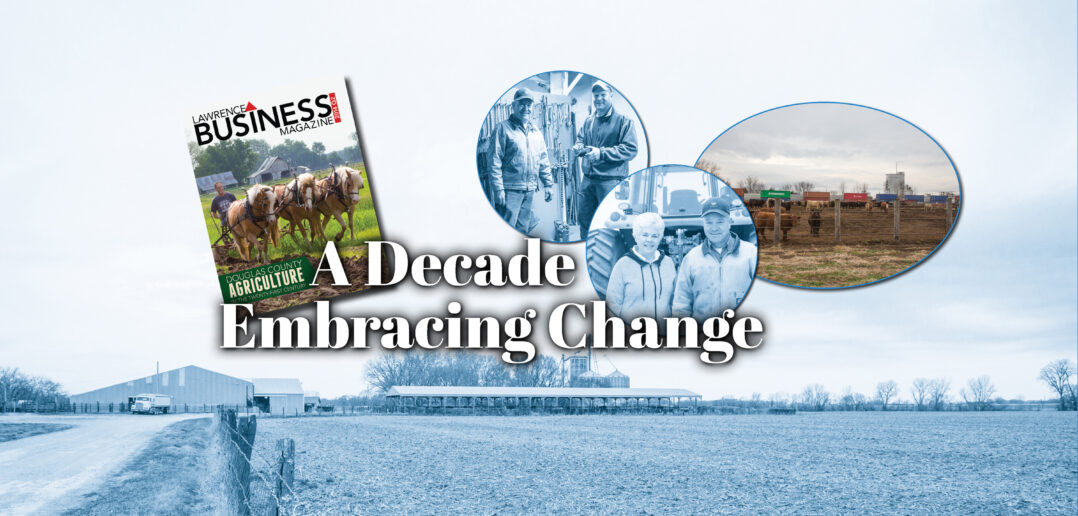| story by | |
| photos by | Steven Hertzog |
| OPEN A PDF OF THE ARTICLE |
The agriculture industry has adapted to many changes during the last decade, including new technologies, labor shortages, rising land prices and new ways to distribute products.
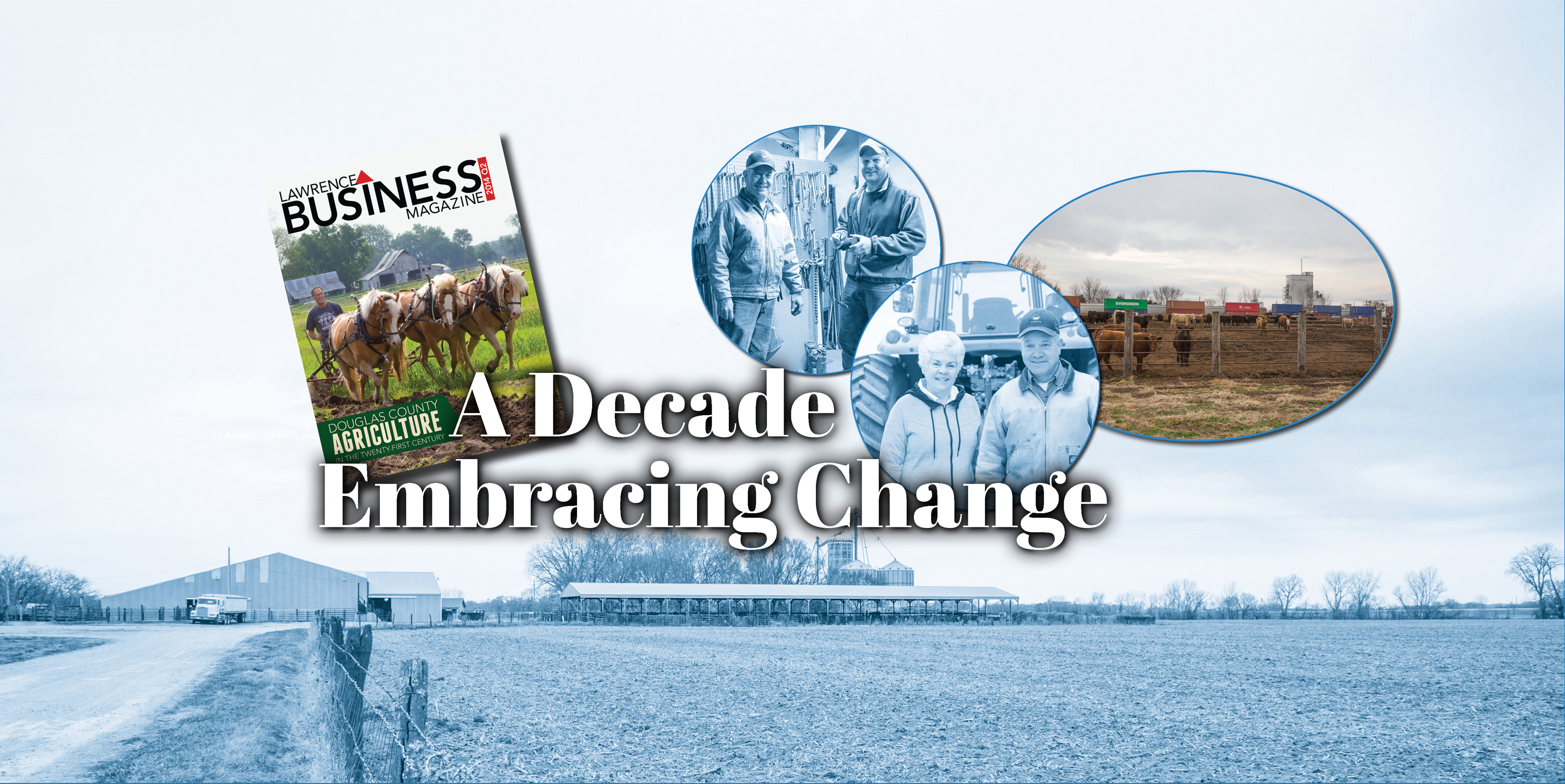
LBM Cover, Agriculture (2014Q2)
The Nunemaker-Ross farm in North Lawrence, Mary & Pat Nunemaker, Kent & Lyle Nunemaker (2017Q1)
Drive any direction from Lawrence, and agriculture looks much the same as it did a decade ago. Cattle grazing pastures, rows of corn and soybeans, tractors pulling implements. Within the city limits, urban farms dot neighborhoods, and farmers’ markets are flourishing.
Look closer, though, and signs of change are everywhere. Farmers are embracing new technologies and markets even as they grapple with the pandemic. Consumers are hungrier than ever for local food, while organizations and policymakers tackle issues like food access and waste. Together, they’re all shaping Douglas County’s food system into one of the state’s best.
“I still think this is the greatest place to be a farmer in the state of Kansas,” says Jill Elmers, owner of Moon on the Meadow Farm and chair of the Lawrence Farmers’ Market board of directors.
She’s not alone. Douglas County had 998 farms in 2017, a 6 percent increase over 2012, according to that year’s Census of Agriculture, which is published by the U.S. Department of Agriculture every five years. It’s hard to predict what the 2022 census will show, but that number is likely to hold steady or decline slightly in keeping with national trends, suggests Tom Buller, the horticulture Extension agent for K-State Research and Extension-Douglas County.
What those farms produce and how much it’s worth may also change. Cattle, grain and oilseeds generated the bulk of the county’s $65.9 million in agricultural sales in 2017. Producers here led the state in fruit and vegetable production, and those sales probably rose thanks to the expansion of existing and new operations including Juniper Hill Farms, in Lawrence, South Baldwin Farms, in Baldwin City, and Big Springs Berries, in Lecompton, Buller explains.
Another fact expected to remain true: While most of the county’s farms are small (77 percent have fewer than 180 acres), its biggest will continue generating most of its agricultural sales.
“There are number of large agricultural producers who really are the bedrock of the ag industry” in Douglas County, he continues.
Big Farms Are the Bedrock
Among those larger farms is Nunemaker-Ross Inc., which is owned by Kent and Debbie Nunemaker, and Pat and Mary Ross, and dates back to when Kent and Mary’s great-grandfather began farming more than a century ago. The business now includes about 5,000 acres of leased and owned crop ground, and an 800-head cattle feedlot. The family is using an established succession plan to gradually transfer most of the crop ground to the Nunemakers’ kids and their spouses—Lowell and Krystale Neitzel, and Lyle and Shelly Nunemaker, who together own Bismarck Farms Inc. Mary Ross says she and Pat will continue overseeing the feedlot.
“It’s important for the farm to continue,” Mary Ross says. “We want to help them all we can.”
Certainly, theirs is a hard-won legacy. The farm survived the Kaw Valley Flood of 1951 and the Farm Crisis of the 1980s, only to be continually tested by roller-coaster commodities prices, weather and, lately, the pandemic. Outbreaks of COVID-19 shut down many of the region’s meatpacking facilities early last year, leaving Nunemaker-Ross with pens of market-ready cattle they couldn’t sell. Fortunately, soaring demand for local beef provided an alternative market.
“We sent a lot of cattle to Bichelmeyer Meats, in Kansas City, and Steve’s Meat Market, in DeSoto,” Mary Ross says of the operation, which typically sources steers from within 100 miles of Lawrence and feeds them until they reach market weight using, in part, spent grains from Kansas City’s Boulevard Brewery. “We’re doing more local, which we like.”
Conditions are better now, but concerns persist about inflation, seasonal labor shortages and rising land values. Still, Mary Ross says they remain focused on operating as efficiently and sustainably as they can while contributing to the local economy.
Farming and commodity agriculture are important “not only to our family but to our community and the lifestyle it represents, and to the economic well-being of us all,” Mary Ross says. “We’re striving more and more to do everything sustainably.”
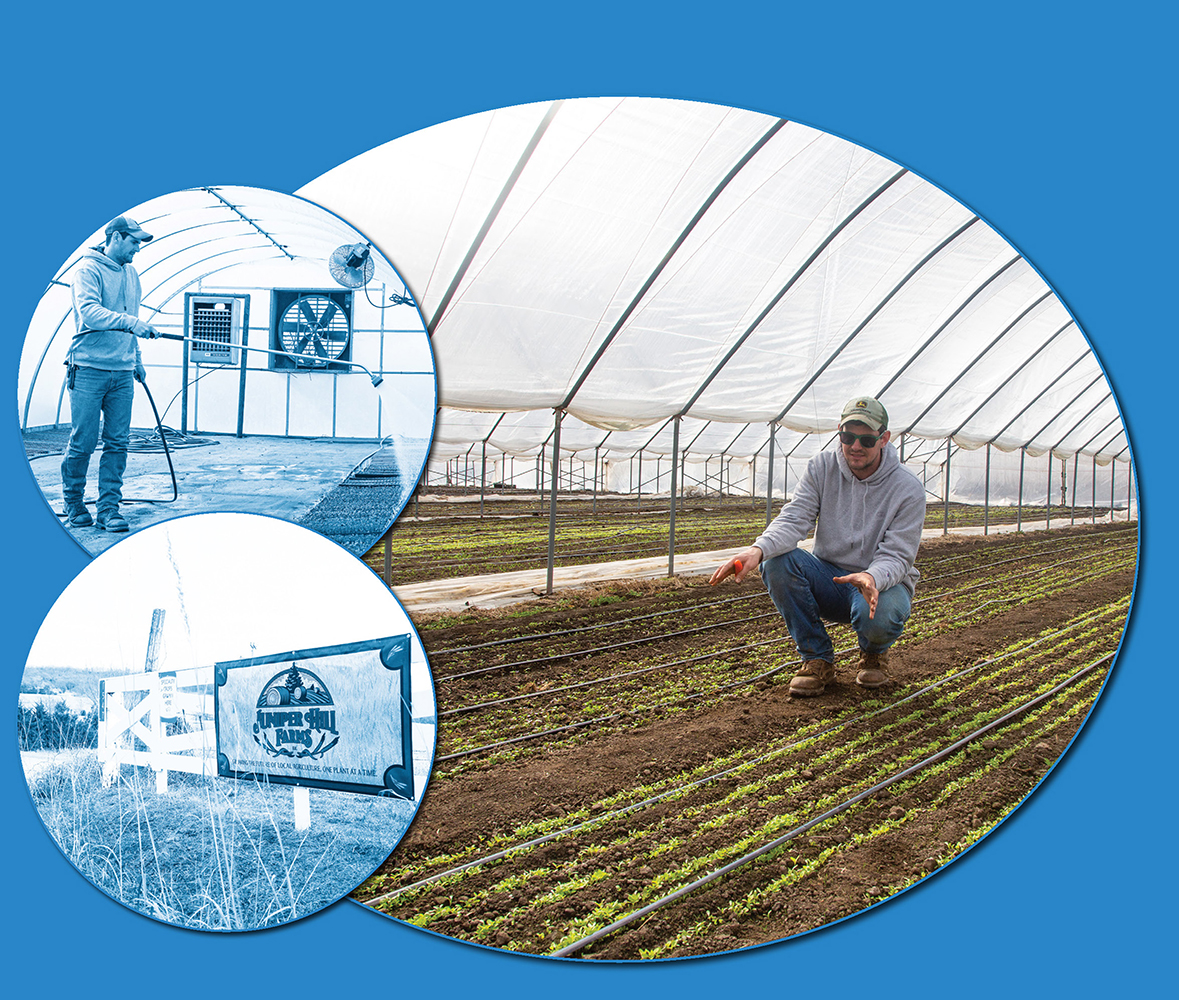
Scott Thellman, owner/operator of Juniper Hill Farms (2020Q1)
Sustainable Legacy
Practices such as no-till farming and planting cover crops have become more commonplace during the past decade on farms like Nunemaker-Ross, as has precision agriculture. That approach incorporates a range of technologies to improve efficiency while reducing wasted seed, fertilizer, fuel, time and other inputs. Tractor guidance systems, variable-rate technology that allows farmers to control the amount of any input used in a specific location, GPS-guided soil-sampling and computer-based applications that create precise field, crop and yield maps and management plans—precision ag can do it all.
It’s high-tech, for sure, and it’s completely changed how Scott Thellman, owner of Juniper Hill Farms, operates.
In July, Thellman spoke from the cab of his John Deere tractor while cultivating organic soybeans destined to become tofu. At one time, he would have stopped the tractor to talk, because driving down soybean rows as a cultivator turns the soil around plant roots would have required his full attention. And now?
“I’ve got my headphones on and am hands-free thanks to the GPS I purchased last year,” Thellman says. “The tractor is for the most part driving for me.”
Thellman started farming in 2010, and he produces both organic and conventional produce and row crops that he sells at the Lawrence Farmers’ Market, The Community Mercantile, area restaurants, food processors and other wholesale clients. Thellman also owns JH Fresh, a food distribution business that carries products from farms including Meat LLC, which is owned by chef and restaurateur Michael Beard. In 2020, Thellman and Beard launched Sunflower Provisions, an online grocery store. He plans to expand his wholesale business beyond the immediate region; toward that end, Juniper Hill recently became GAP certified, a designation that’s short for “good agricultural practices” and demonstrates compliance with USDA food safety requirements. Thellman is also building a processing kitchen to turn surplus produce into marketable food products. Did he anticipate any of this back when he started? “Not in a million years,” he says.
“I’ve had a supportive family and community, and great employees over the years,” says Thellman, who serves on the Kansas State Board of Agriculture. “That’s the reason I’m here today.”
Thellman is optimistic about the future, although he notes produce sales will continue to lag until his school, restaurant, corporate and other wholesale customers are able to fully reopen. Finding employees is tough, too. Juniper Hill has eight full-time and three seasonal workers. Thellman wants to hire more workers but isn’t sure he’ll be able to find them.
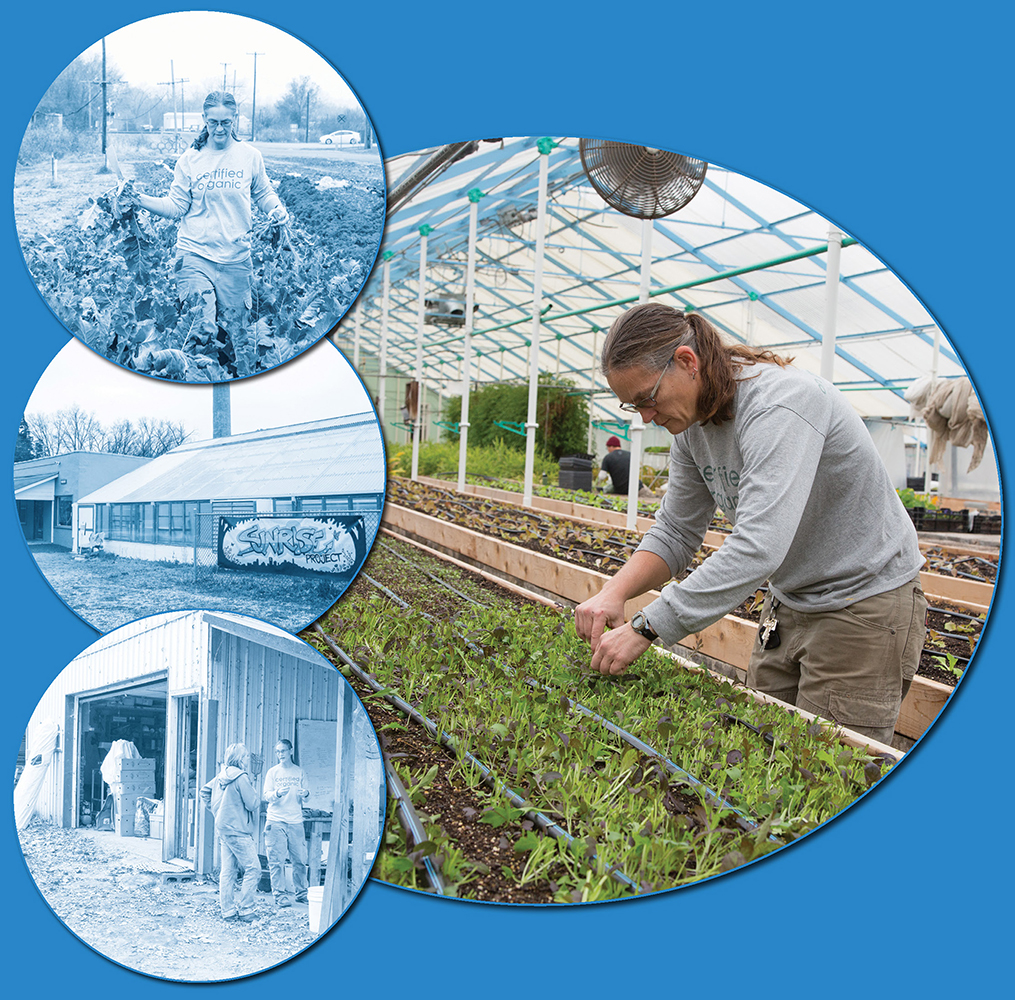
Jill Elmers, owner of Moon on the Meadow (2017Q1)
Of Climate and COVID
Another worry: climate change. Farmers say they’re experiencing more—and more extreme—weather events such as flooding and drought, and researchers are compiling evidence of what climate change will mean for the crops they grow. For example, researchers at Kansas State University and North Carolina State University recently showed that warmer nighttime temperatures associated with climate change disrupt key biological processes like photosynthesis and respiration in rice. Similar studies at Kansas State University indicated a 5 percent reduction in wheat yield for every 1C increase in temperature.
“Plants use nighttime to recover from the stress of heat during the day,” Moon on the Meadow’s Elmers explains. “When our nighttime temperatures keep rising, plants don’t have that opportunity to rest and regenerate.”
Elmers’ certified organic farm has grown steadily over the past 20 years, and she sells produce at the Lawrence Farmers’ Market and through the Common Harvest CSA, a collaboration with Mellowfields Farm and six other area food producers. Her farm in 2019 posted record sales, and Elmers went into 2020 thinking she’d slow down a bit. But then—COVID.
“Everybody wanted our food,” Elmers says. “I mean everybody. There was no way we could let them down.”
She increased production and launched an online store that delivers within Lawrence’s city limits, relying more than ever on her six seasonal employees to help get it all done. A Coronavirus Aid, Relief and Economic Security (CARES) Act grant allowed her to meet her goal of paying employees through December 2020. The funds also enabled capital improvements, including revamping the area where produce is washed and packed, and building a drying barn for garlic, shallots and onions—things Elmers considers “game changers.”
Sales have so far held steady in 2021, but Elmers is now not thinking so much of slowing down as she is about helping younger farmers become established.
“It’s our responsibility to educate (younger) farmers and support them in whatever farming looks like to them,” she says.
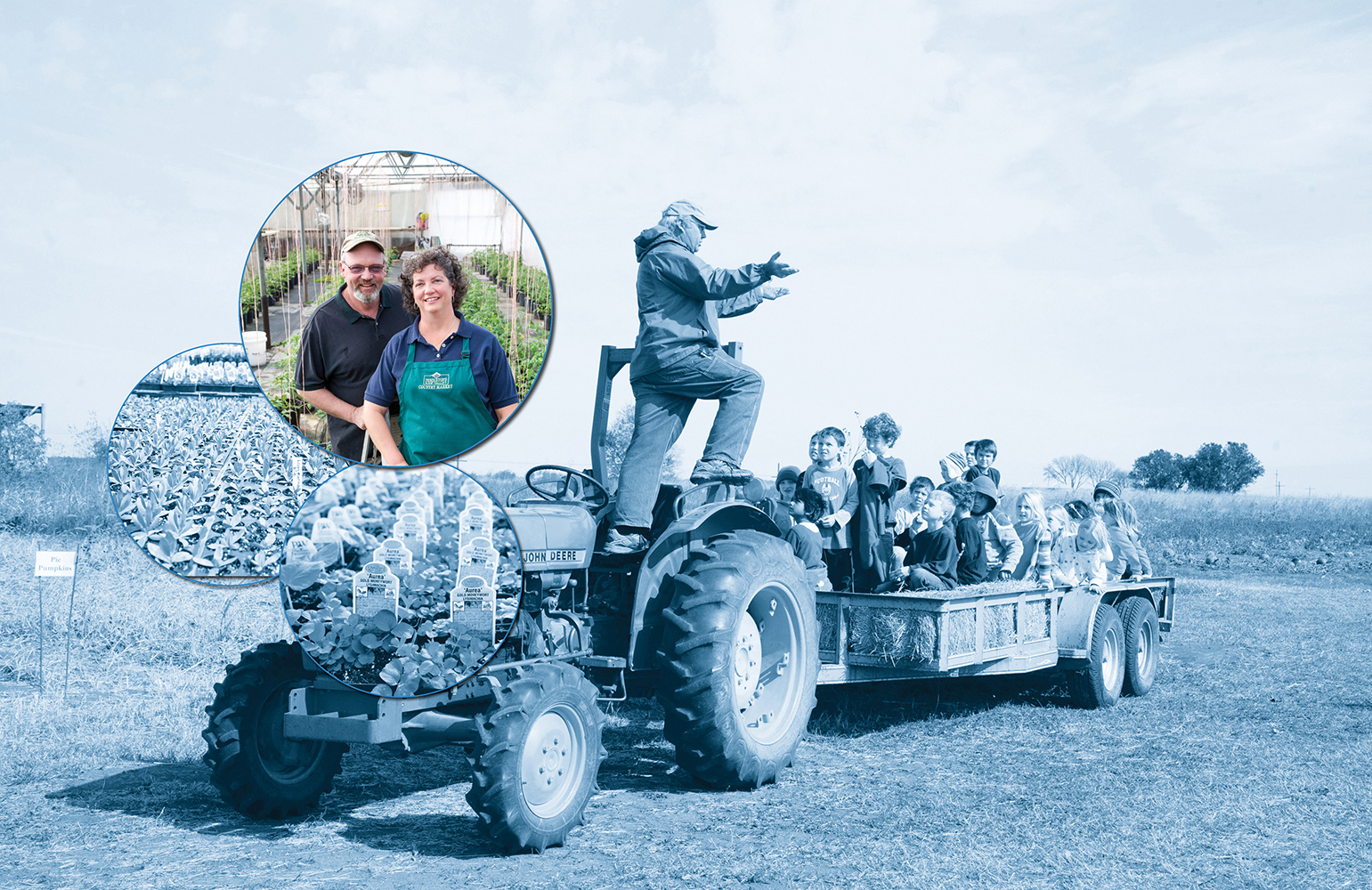
Karen and John Pendleton pose in their hydroponic tomato house (2020Q1) and John gives a tour of their farm to elementary school students (2013Q1)
Resilience at Pendleton’s
Forging your own path isn’t always easy, as John and Karen Pendleton, of Pendleton’s Country Market, well know. The couple began farming with John’s parents 40 years ago, helping manage a cattle feedlot and about 1,000 acres of row crops—just as drought, high interest rates and a grain embargo on exports to the former Soviet Union spawned the Farm Crisis.
Diversifying into asparagus, hydroponic tomatoes and bedding plants helped them hang on, and by the 1990s, they were growing primarily vegetables, flowers and other plants for sale at their farm store through a CSA and at farmers’ markets. Things were going well. Then, in March 2006, a powerful microburst damaged or destroyed almost every building, vehicle and piece of equipment on the farm. They rebuilt only to be hit by an EF-3 tornado in May 2019. The Pendletons were still recovering from that when the pandemic began.
Like other producers, they experienced a surge in food demand during 2020. Customers flocked to the farm store to collect orders and pick their own asparagus and other vegetables, often driving in from Johnson and other counties to do so. But that was nothing compared to what happened when they launched their online store.
“Oh my gosh, the floodgates opened,” Karen Pendleton says.
Sales remain robust in 2021, and most customers have returned to in-person shopping. The challenge currently lies with their supply chain, as some wholesalers prioritize large chains, leaving smaller independent retailers scrambling.
“We couldn’t get seeds (last spring), we couldn’t get certain plants or potting soil,” Karen Pendleton says. “Our sources dried up.”
The Pendletons, however, are nothing if not resilient. While they hope to eventually find a buyer for their business, they are for now happy serving what has proven to be a loyal customer base.
“People just want to be a part of our farm,” she says.

Butterflies at Pendleton Farms and Michael Steinle, Hugh Carter and Kim Criner Ritchie listen together at a Douglas County Food Policy meeting (2019Q4)
Forging Food Connections
Deepening such connections is clearly important for Lawrence and Douglas County residents, so much so that in 2010, the Douglas County Food Policy Council (DCFPC) was formed to advise local government about opportunities and challenges throughout the food system, particularly as they pertain to the regional food economy, natural resource conservation, food access, food equity and food waste. The DCFPC’s Food System Plan was adopted in 2017 by the Douglas County Board of Commissioners and the Lawrence City Commission, and it has since become a vital resource as city and county leaders consider a variety of issues pertaining to how food is produced, accessed and disposed of.
That’s a broad remit but one that has yielded visible results, explains Kim Criner Ritchie, Sustainability and Food Systems analyst for the Lawrence-Douglas County Sustainability Office. Among those is Common Ground, an urban agriculture program that has grown to 10 sites within Lawrence. Those include community gardens and orchards, a permaculture site, communal gardens that donate food and host tours, and a 41/2-acre incubator farm for aspiring growers.
The Food System Plan was also essential to winning a USDA grant that now finances the county’s nascent gleaning program, Criner says. The effort brings volunteers together to harvest leftover produce from area farms and distribute it to Just Food, the Sunrise Project, the Lawrence Community Shelter and other agencies. The Food System Plan is also being used during development of the city’s economic development strategic plan, Downtown Master Plan, transit planning and other initiatives.
It all helps strengthen the ties between food and community while creating a vibrant agricultural identity for Douglas County that respects tradition as much as looks to the future.
“We’re definitely on the right track when it comes to the cohesion our food system has throughout the community,” Criner says. “It’s all about the connections and partnerships people are building.”
![]()

